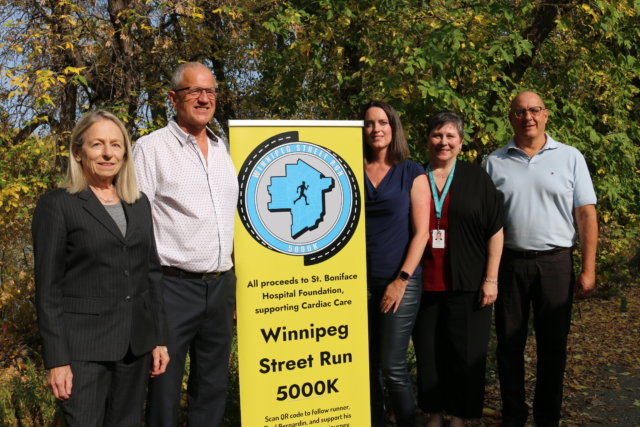October 10, 2023
While on a trek to Mount Everest base camp in 2006, Paul Bernardin, of Winnipeg, unknowingly experienced his first heart attack. He was just 49 years old. At an elevation of about 15,000 feet, Bernardin felt a sudden soreness in his jaw, arms, and chest. He noticed that during any ascents, his jaw pain worsened. His fellow climbers assumed he was struggling with the elevation, and he was treated for altitude sickness.
Unfortunately, after he returned home, Bernardin experienced a second heart attack. A smoker for most of his life, he had quit smoking over a year prior. During a momentary relapse, he took an inhale of a cigarette and immediately felt those familiar symptoms: a soreness in his arms and jaw, a squeezing feeling across his chest, and persistent nausea. Knowing that he was in danger, he dialed 911. The ambulance arrived “in no time at all,” said Bernardin.
It turned out Bernardin was experiencing a STEMI – the most serious kind of heart attack. He was sent to the Cardiac Catheterization Lab at the Hospital and received a stent to open blood flow to his heart. He survived, thanks to the compassionate care and quick intervention at St. Boniface Hospital, Manitoba’s Cardiac Centre of Excellence.
“Once you get in, it’s like a well-oiled machine. It’s so efficient. Everything and everyone just moves into place,” Bernardin remarked when reflecting on the excellent care. “When you really need help, things run so smoothly. It’s the most amazing thing.”
Bernardin had a positive effect on his care providers as well. Dr. Ivan Barac, his cardiologist, reflected fondly on his experience treating Bernardin. “Having a patient like him is a great joy for every physician, particularly a cardiologist. Each time I see him, shaken with all these less successful stories, he boosts my morale, giving me a push to do everything I can to help all my patients to change their lives.”
Bernardin was given more time by his cardiac care team. This time gave him the energy and motivation to lead a healthier life. Wanting to take control of his well-being, Bernardin took up running. By Father’s Day of 2008, he had completed his first Manitoba half marathon. He kept going.
Now, 15 years later, he’s completed 18 full marathons, 70 half marathons, and he’s still running. In November of this year, Bernardin will run the largest marathon in the world: the New York City Marathon.
When the pandemic hit, Bernardin’s running plans were put on hold. He had to get creative. Working around restrictions, Bernardin signed up for virtual runs, staying within his neighbourhood. Wanting to make a difference while pursuing his passion, he decided to transform his runs into a fundraiser. Bernardin decided he would raise money to give back to the team who saved his life in 2006. To stand out, he decided to give himself a new challenge. Bernardin is making it his mission to run all the streets in Winnipeg, totalling 5,000km. That’s the same as running coast to coast, from Vancouver to Quebec City.
Bernardin aims to raise $50,000 for cardiac care at St. Boniface Hospital. His fundraiser will run until 2026, the 20th anniversary of Bernardin’s heart attacks.

Join the fight against heart disease by supporting the Winnipeg Street Run 5000K here. With your donation, you are helping cardiac patients like Paul get back to doing what they love.
Interested in giving back in your own way to St. Boniface Hospital? Learn more about creating your own fundraiser to help patients in need.


